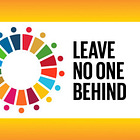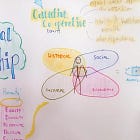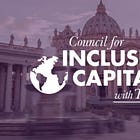There is no outside
We stand at a fork in the road that most people can't even see, because the signs were deliberately hidden.
One path looks like progress — international cooperation to solve global problems, democratic deliberation, technology serving humanity. The other path leads to a self-managing system that treats people like variables in an optimisation equation.
A system which promises to ‘restore balance’ between man and his environment.
This is a more accessible version of yesterday’s post.
This isn't ‘conspiracy theory’, but about how good intentions are being deliberately manipulated to serve something vastly different to what’s promised, and which could ultimately change what it means to be human. And it's happening right now, built from pieces that already exist, built due to treaties passed decades ago, justified by crises — commonly fabricated.
And those who built the system commonly did so because they believed they were saving the world.
The 1968 Foundation
The story starts in 1968, when UNESCO held the first international conference on the scientific basis for rational ‘use and conservation of the biosphere’. Sounds boring, perhaps? Academics gathering to discuss early environmental policy. Nothing seemingly threatening about that, at least at first glance.
But buried in their recommendations was a phrase that would echo decades on: ‘the establishment of the necessary balance between man and his environment’. Necessary — not desirable, but necessary. Required.
This phrase transformed how international organisations think about human-environment relationships. Instead of seeing humans as creative beings who adapt to challenges, it positioned us as variables that need to be managed, balanced, even optimised within larger (eco)systems.
The people at that conference were supposedly responding to early environmental concerns with what seemed like rational, scientific approaches. But they created a conceptual framework that treats human populations as components to be managed rather than free agents with rights.
The Manhattan Principles
By 2004, these ideas had crystallised into the Manhattan Principles, developed by organisations such as the World Conservation Society, World Health Organisation, and the UN Food and Agriculture Organisation. If you read through these principles today, you can see how thinking shifted from human-centered to system-centered approaches. But the phrasing is clumsy, perhaps even opaque.
Manhattan Principle 6 says biodiversity conservation must be ‘fully integrated’ with human health solutions. On the surface, this makes sense — environmental health affects human health, right?
But look at Principle 8. It authorises ‘mass culling of free-ranging wildlife species’ when there's ‘multidisciplinary, international scientific consensus’ that a population poses threats to human health or ecosystem stability. The language is sterile, bureaucratic, perhaps even tedious. But it establishes a crucial precedent: populations can be managed through expert consensus rather than democratic processes.
The Berlin Principles, updated in 2019, update the Manhatten Principles by explicitly stating that humans should be treated ‘like the other animals’ in ecosystem management decisions. Follow the logic: if wildlife populations can be culled based on expert consensus when they threaten ecosystem balance, and humans are to be treated like other animals in these frameworks...
This isn't paranoid speculation. This is following the written policies to their logical conclusion — especially in light of contemporary developments in the sphere of AI.
The COVID Test Run
Then came 2020. If you're a media-believing parent, you likely remember those early weeks of COVID — the fear that gripped you as you watched the news, calculating whether you had enough supplies to protect your family. That fear was real (though the emergency was not). The desire to protect our loved ones was the most human response possible. But that crisis became a testing ground for something much larger.
Within weeks, unprecedented restrictions on human movement and association were implemented across the globe — not based on direct observation of local conditions, but on computer models predicting future risks. Teams at places like Imperial College London created mathematical projections that justified locking down entire nations. Millions of people were confined to their homes based on algorithmic forecasts that often proved wildly wrong.
The psychological shift this created was significant. We learned to accept algorithmic authority over human judgment, expert consensus over democratic deliberation, international coordination over local decision-making. And when the models failed? Instead of questioning them, the people who questioned the models were portrayed as ‘anti-science’, while the media casually (and uncritically) accepted that ‘the science changed’ for the 114th time.
During this period we built the infrastructure for comprehensive population control and called it public health. Contact tracing apps, digital health certificates, QR codes for basic social participation — people didn't just accept these systems, many in fact demanded them, believing them to be a necessity given the alleged, dangerous disease.
The Digital Prison We Built Ourselves
Right now, as you read this, your smartphone knows exactly where you are. It knows where you've been, who you've been with, likely what you've bought, and even what you searched for when browsing the internet. This comprehensive surveillance network wasn't imposed through military occupation — it was constructed, and we tacitly accepted it, app by app, convenience by convenience.
The infrastructure for real-time population monitoring now exists everywhere. The legal frameworks for activating control systems during ‘emergencies’ have been tested and proven effective. Public acceptance of algorithmic decision-making over human judgment has been firmly established.
What's left is simply expanding the definition of ‘emergency’ to include virtually any deviation from optimal parameters. Climate change, social inequality, economic disruption, political dissent — the computational models can frame almost anything as an emergency requiring intervention.
And that expansion is already happening.
The WHO Pandemic Agreement
The 2025 WHO Pandemic Agreement formalises everything learned during COVID, but with a crucial expansion. It extends pandemic prevention beyond observable disease outbreaks to include algorithmic predictions of ‘pandemic potential’ based on environmental, social, and economic factors.
Think about what this means in practice. Climate change models, biodiversity assessments, social inequality metrics, even economic disruption patterns can now trigger ‘pandemic potential’ alerts. When these alerts cross algorithmically-determined thresholds, the same intervention tools used during COVID — lockdowns, movement restrictions, mandatory medical treatments — can be activated automatically. Last time they were activated as positive testing rate crossed a numerical threshold, next time the threshold will be even further removed from personal agency.
This isn't theoretical. The agreement is signed. Your elected representatives have already delegated their authority to respond to ‘emergencies’ to international organisations that operate beyond democratic oversight, using criteria determined by computer models you'll never see, programmed by people you'll never meet. While it’s framed as ‘soft power’, in practice it functions as ‘soft coercion’ — especially during declared emergencies (legit or not).
The power to decide when emergencies exist and how to respond to them has been outsourced to algorithms and expert panels that profit from the emergencies they identify. And you cannot realistically challenge them.
The Security Council Reform
Here's the part that transforms everything from ‘soft pressure’ into binding law: the ongoing push to eliminate veto power in the UN Security Council and expand its jurisdiction to include ‘environmental crimes’.
Current reform proposals would remove the ability of major powers to block Security Council action while simultaneously expanding Council authority to declare ‘ecocide’ and biodiversity emergencies as threats to international peace and security. This isn't some distant possibility — these reforms are actively being negotiated right now.
Once implemented, this creates a direct pathway from algorithmic environmental monitoring to binding international emergency declarations backed by military enforcement. Here's how it would work:
Environmental monitoring systems detect ‘ecosystem imbalance’ based on computational modelling of biodiversity loss, climate change, or social factors, and the predictive models thus calculate a global risk. When the algorithms determine that these risks cross predetermined thresholds, a reformed Security Council can declare a ‘Planetary Health Emergency’ without any nation being able to veto the decision.
That declaration automatically triggers multiple pre-authorised response frameworks: WHO Pandemic Agreement authorities, international intervention protocols, and stakeholder coordination mechanisms — which per Manhattan Principle 9 include pharmaceutical companies as operational partners.
Suddenly, computer models monitoring everything from forest coverage to social media sentiment can trigger binding international emergency responses that override national sovereignty and individual rights. No human politician to blame, challenge, or even vote out of office — just algorithms, and politicians following their programming. Should they refuse, the MSM will quickly begin the smearing campaign.
The Four-Domain Control System
What emerges from these frameworks is a comprehensive control system operating across every aspect of human life. It's not imposed through military coups or overt totalitarianism — it's implemented through existing legal structures, justified by scientific necessity, and typically applauded as moral progress.
Territorial Control operates through ‘integrated landscape management’ (‘Landscape Approach’) that sounds environmentally responsible. Property owners keep their deeds, but actual land use gets determined by ‘ecosystem service’ algorithms calculating optimal management for carbon sequestration and biodiversity conservation. You can technically own land — but you won’t get to control what happens with it.
Resource Control functions through carbon credit systems and environmental compliance measures that start as voluntary programs. Digital identity systems gradually link individual carbon allowances to energy access, transportation permissions, and purchasing power. Environmental awareness becomes algorithmic rationing of basic necessities.
Information Control emerges through ‘scientific education’ and ‘misinformation prevention’ that many people support. School curricula align with ecosystem management principles while research funding flows only toward studies supporting global governance frameworks. Dissenting perspectives don't get censored — they get defunded until they disappear, censored from social media, and authors will find themselves out of a job because they somehow broke their ‘ethics disclaimer’.
Knowledge Control operates through expert consensus formation and professional accreditation that makes career advancement conditional on alignment with approved frameworks. Independent scientific inquiry doesn't become illegal — it becomes economically impossible to sustain.
Each layer reinforces the others through automated data sharing. Territorial monitoring feeds environmental data into resource allocation algorithms. Digital identity systems managing resource access also filter information flows.
Educational institutions promoting ecosystem thinking create future ‘experts’ who validate algorithmic decision-making.
When Profit Meets Policy
Perhaps one of the most troubling aspect is how corporate interests get integrated into governmental functions. Manhattan Principle 9 establish pharmaceutical manufacturers as formal ‘stakeholders’ in global health surveillance and response systems. The same companies that profit from ‘pandemic potential’ interventions help determine when that potential exists and what responses are necessary.
This creates a perfect feedback loop: entities that benefit financially from emergencies help identify emergencies and design responses to them. During COVID, we saw how this partnership model could suppress dissenting voices, manipulate public information, and prioritise corporate profits over individual rights.
Now this arrangement is being formalised into permanent governance structures that operate beyond democratic accountability. Private companies gain quasi-governmental authority while maintaining profit motives — the worst of both worlds.
However, even those corporations are down the pecking order at the end of the day.
Programming the Next Generation
Walk into any classroom today and observe what children learn about themselves and their role in global systems. You'll find curricula systematically teaching young people to consider individual desires as selfish, personal judgment as dangerous, and human activity as inherently problematic for planetary health.
Environmental consciousness and global cooperation perhaps are important values. But when taught without corresponding emphasis on individual rights, personal agency, and democratic accountability, they ultimately become preparation for algorithmic governance rather than environmental stewardship.
Your children are learning to see themselves as components within managed systems rather than autonomous agents with inherent dignity. They're being conditioned to accept expert authority over personal judgment, algorithmic efficiency over human choice, collectivism over individual freedom.
The concepts of personal sovereignty and democratic accountability may seem as antiquated to them as absolute monarchy seems to us.
Digital Twins and Predictive Control
Behind the policy frameworks lies technical infrastructure that makes comprehensive population management feasible for the first time in history. Organisations like the International Institute for Applied Systems Analysis develop ‘BLOOM’ models linking biodiversity changes to disease risks, creating computational frameworks that predict ‘pandemic potential’ from virtually any environmental or social change, thus linking up nicely with the pandemic treaty.
These models are ‘Digital Twin’ systems that simulate entire ecosystems, economic networks, and population behaviors in real-time. Combined with surveillance data from satellites, sensors, and personal devices, they claim to identify deviations from ‘optimal’ parameters and recommend interventions before problems become observable to human judgment.
The technology itself perhaps represents a remarkable human achievement. But it's being deployed within governance frameworks that treat human populations as variables to optimise rather than citizens to serve. And it, ultimately, cannot be held to account, because after all — it’s a computer algorithm. Besides, it will be claimed that mispredictions were the result of lack of ‘indicator’ data, which will then be used as an excuse to build even more intrusive surveillance systems.
Love as Leverage
The system's genius lies in transforming our highest virtues into control mechanisms. Our love for our children becomes support for surveillance systems that ‘protect’ them from future pandemics. Our compassion for the vulnerable becomes acceptance of restrictions that ‘save lives’. Our environmental concern becomes compliance with monitoring systems that ‘preserve the planet’.
They don't need to convince us to choose servitude over freedom. They only need to convince us to choose safety over risk, collective good over individual rights, expert wisdom over personal judgment. And they frame these choices as moral imperatives rather than political decisions.
Your neighbor's support for environmental protection, your teenager's climate activism, your own desire to be a responsible global citizen — these human impulses create the social pressure that enforces compliance with your own subjugation.
The Enforcement Mechanism
Traditional authoritarian systems required extensive police apparatus and overt violence. This new approach is far more subtle and potentially more effective. Instead of sending armed agents to enforce compliance, it simply withdraws access to financial services and digital infrastructure that modern life depends upon.
Your bank account, employment, transportation, healthcare, your children's education — all increasingly depend on digital systems that can be programmed to recognise only ‘compliant’ individuals. ‘Immoral’ non-compliance doesn't result in arrest — it results in algorithmic exclusion from basic social participation.
This enforcement mechanism is particularly insidious because it appears to be a natural consequence of personal choices rather than governmental punishment. Choose not to maintain adequate carbon compliance scores? Your energy access gets naturally restricted. Choose not to participate in health monitoring? Your healthcare access becomes naturally limited.
The system doesn't punish resistance — it simply stops recognising non-compliant individuals as valid participants in optimised social networks.
Representation Without Power
Perhaps the most tragic aspect is how this transformation hollows out democratic institutions while maintaining their appearance. You can still vote, but your elected representatives have systematically delegated their authority to international organisations, expert panels, and stakeholder networks that operate beyond democratic accountability.
Government officials become middle management in a global system they don't fully understand and can't meaningfully control. They implement policies determined by international frameworks, justify decisions through expert consensus, and coordinate responses through stakeholder networks that include the very entities profiting from the problems being addressed.
Democracy becomes theater — a ritual providing legitimacy for decisions made elsewhere through processes you cannot observe, influence, or hold accountable.
The Implementation Timeline
None of this happens overnight. Each step appears reasonable in isolation, and the policies being implemented to address these challenges are often sensible responses to what appears to be genuine problems. The danger lies not in individual policies but in their cumulative effect: systematic power transfer from democratic institutions to algorithmic systems, from local communities to international organisations, from human judgment to computational models.
We're witnessing the gradual construction of a comprehensive management system for human populations, implemented through legitimate institutions, and often supported by well-meaning people who cannot see the larger pattern.
The Window of Choice
Understanding this system is the first step toward preventing its completion. This doesn't require conspiracy theories — only willingness to trace the logical implications of frameworks that already exist and examine the trajectory of power transfers that have already occurred.
The choice isn't between environmental protection and environmental destruction, or between public health and personal freedom. It's between human agency and algorithmic management, between democratic accountability and expert authority, between local adaptation and global optimisation.
We can coordinate globally while maintaining local sovereignty. We can use technology to enhance human capability rather than replace human judgment. But only if we recognise what's being constructed around us and choose deliberately to build something different.
And it begins by holding those to account who outsource decisions to computers. Google’s excuse that ‘the algorithm did it’ when search results favour a political candidate should not allow them to shirk responsibility. They wrote the software, and it was their choice to implement it in practice. They should be held fully accountable for their actions. Hiding behind an opaque algorithm means they get to erect a firewall, shielding them from ultimate responsibility.
Your Children's Future is at Stake
Your children will inherit the world created by choices made today. They'll live with the consequences of the systems we build, the authorities we legitimise, and the freedoms we surrender in pursuit of safety and the ‘collective good’ which none of us were ever afforded a chance to vote on.
The machine being constructed will outlast us all. Once operational, it will shape human development for generations. The values embedded in its algorithms, the interests served by its optimisation functions, the limitations built into its authority structures — these will determine what kinds of lives our descendants can live.
We still have time to choose differently. We still have power to demand that global challenges be addressed through democratic means, that technological capabilities serve human agency rather than replace it, that expert knowledge inform decisions rather than determine them, that corporations don’t get to hide behind software and are made to take full responsibility for their action.
But this window is closing rapidly. Every day we delay is a day closer to the point where the choice gets made for us by systems we can no longer control, justified by emergencies we cannot question, implemented by authorities we cannot hold accountable.
The future of human freedom hangs in the balance. And that balance tips with every system we accept, every authority we legitimise, every choice we make in the name of safety, efficiency, and weaponised claims of ‘the greater good’, and what it means to be an ‘ethical’ human being.
The time for comfortable assumptions about democratic resilience is over. The time to understand how ‘global ethics’ has been weaponised has just begun.
The time for deliberate choice about who controls our children's future is now.
For a fully sourced, in-depth version of the above, see ‘Leave No One Behind’.








Excellent analysis of the threats that hang over us all like a sword of Damocles hidden in the clouds. Thank you for helping to raise awareness.
Jakob Nordangard has said that in a computer game, the avatars can't control the game - they are bound by the rules and the ruler that created them. So is it, according to Nordangard, that those who wish to control the game on planet Earth must fail. Avatars are limited by the roles that have been created for them.
The power of government was magnified in our perception under the lens of COVID. We were hornswoggled. However, imagine Keir Starmer or Donald Trump with court jester hats on. Because that's what they are - entertainers and imperfect pretenders who in their all-too-human fallibility are pre-destined to have their inevitable pratfalls and tragic errors that will lead to their downfalls. In our all too human hubris, he who aspires to fly too high will inevitably have his wings melt and come crashing down to earth.
I take it on faith that world technocratic control is a mad hubristic megalomaniac and unachievable power-trip fantasy of those wealthy individuals who have nothing better to do with their time than generate pipe-dreams of ever-more power and wealth for themselves. This is not reality. I take it on faith that these madmen will eventually be hoist by their own petards, brought down by the unforeseeable emergent properties of complex systems they aspire to master. We don't need to fight it, although fight it we must, because that is the role we play as avatars. Their role is to rise high and then crash and burn. We are there to bear witness to it, and then pretend we always knew it was inevitable. But our role for now is to be frightened to death of it, and to gird for battle. So off to the front we go!